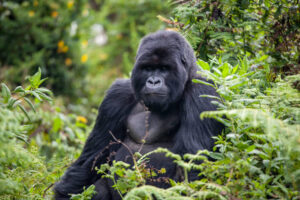The International Gorilla Conservation Programme (IGCP), a coalition comprising Conservation International, Fauna & Flora, and WWF, has achieved significant milestones in mountain gorilla conservation, overcoming numerous challenges along the way since its inception in 1991.
On 23rd September, 2024 the report was released to mark World Gorilla Day, titled “Over 30 Years of Impact in Mountain Gorilla Conservation,” IGCP reflects on its accomplishments in collaboration with the Democratic Republic of Congo, Rwanda, and Uganda.
The efforts have led to a remarkable increase in the mountain gorilla population, rising from approximately 600 individuals to 1,063 as recorded in the 2019 Bwindi-Sarambwe census. The hope has been offered for the survival of these majestic creatures after recovery has sparked renewed global conservation efforts. Mountain gorillas remain a conservation-dependent species despite being the only great apes with a growing population.
Mr. Wellard Makambo, IGCP Director said that they have worked tirelessly for over three decades, innovating our approaches to support mountain gorilla conservation at both the population and trans-boundary landscape levels. “the collaboration across the three countries, which has enhanced social and political support for conservation, increased tourism revenue-sharing with local communities, and improved the management of mountain gorilla parks.” He high lightened.

Gorilla in bwindi National Park sitting.
IGCP over the years alongside protected area authorities, has led various mountain gorilla censuses and ecological surveys. Through facilitating more targeted conservation efforts, these initiatives have helped verify population trends and understand the ecological threats gorillas face.
To benefit directly from conservation initiatives, the program has also empowered local communities fostering genuine partnerships that enhance community livelihoods, access to fresh water, and conflict management between humans and wildlife.
Challenges faced during the journey.
- poaching.
- Habitat loss.
- Political instability.
- Diseases.
- Infrastructure development
These challenges have continued to endanger the long-term survival of mountain gorillas and their neighboring communities.
Makambo noted that mountain gorilla numbers have been steadily rising for the past two decades, thanks to science-based conservation actions. Their threat status was downgraded from ‘Critically Endangered’ to ‘Endangered’ in the IUCN Red List of Threatened Species in 2018.
“On the significance of the mountain gorilla’s recovery amid a decline in other great ape populations. “Biodiversity Practice Interim Leader at WWF Wendy Elliott remarked. She added saying that the IGCP’s focus on deep partnerships with local communities and governments has proven essential for real success in conservation.
To mobilize global support for conservation, Cath Lawson, Senior Programme Manager at Fauna & Flora, praised IGCP’s effectiveness as a trans-boundary facilitator, emphasizing its people-centered approach and ability.
IGCP continues to advocate for the protection and sustainable management of these iconic species and their habitats as the world celebrates the progress made in mountain gorilla conservation.







